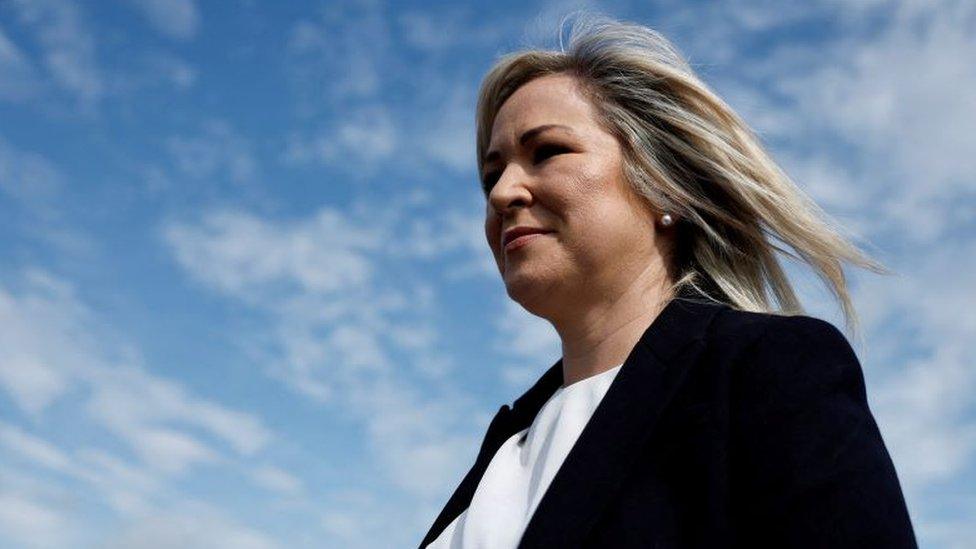NI council elections 2023: A Sinn Féin coronation after a 'tsunami' election
- Published
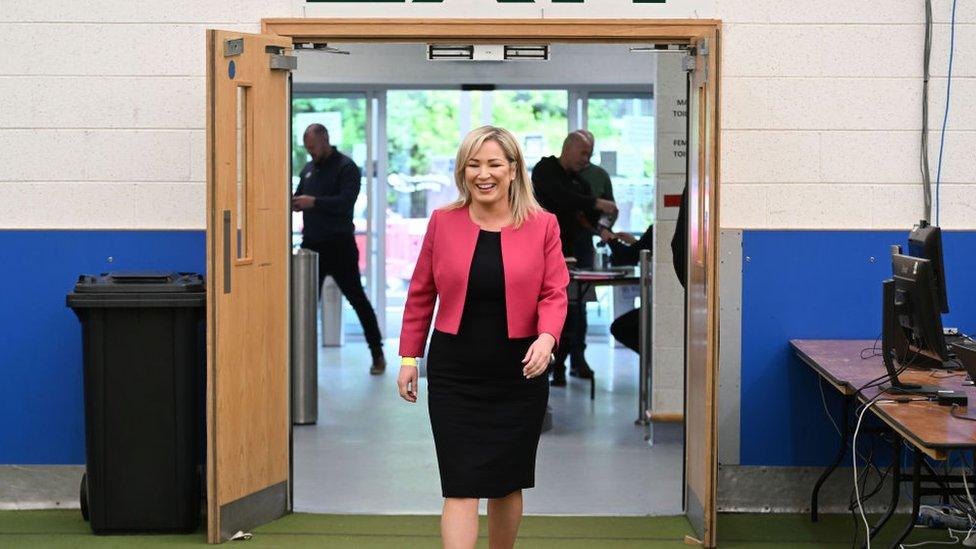
Big smiles for Sinn Féin's Michelle O'Neill at Magherafelt count centre
In the end it was more a coronation for Sinn Féin than a contest; crowned local government kingpins without even breaking a sweat.
From the moment the first ballot box was opened the party was on course to make history.
But not even Sinn Féin predicted the scale of its success.
Sweeping to victory with a staggering 144 seats, leaving the once dominant DUP trailing 22 seats behind.
Almost one in every three votes cast went to Sinn Féin and it picked up new seats in 10 of the 11 super councils.
Even in the council where it suffered its greatest loss last time - Derry and Strabane - the party secured seats for all of its 18 candidates.
Along the way Sinn Féin also picked up some trophy seats in the unionist heartlands of Ballymena, Lurgan and Coleraine.
A 'green wave'
But this was a council election which had nothing to do with councils.
This was a poll played out against the backdrop of the Stormont stalemate.
Both Sinn Féin and Alliance framed their campaigns around making Stormont and politics work.
That message hit home with those voters frustrated at the lack of devolved government at a time when so many of them are struggling in the cost-of-living crisis and fearing further budget cuts coming down the line.
These were easy campaigns to run, centred on a clear message.
But Sinn Féin had an added advantage.
The DUP's Stormont boycott, which is effectively blocking Michelle O'Neill from becoming first minister, helped mobilise the nationalist vote.
For the first time, nationalists outpolled unionists in first preference votes - it was roughly 40%, slightly higher than the unionist vote at about 38%.

According to the SDLP, the DUP's stance played into the hands of Sinn Féin.
Hence the party framed its campaign around a would-be first minister willing to work for all if only she was allowed.
Michelle O'Neill's attendance at the King's Coronation helped to reinforce that "positive" message.
To quote Naomi Long, the Sinn Féin surge was like a "tsunami" which caught the other parties by surprise.
Such was the size of the green wave, it left some unionists bewildered.
One former Ulster Unionist minister suggested Sinn Féin might scale back its ambition in the interest of preserving cross-community relations.
He raised it during a count centre chat with Sinn Féin President Mary Lou McDonald.
'Wake up and smell the coffee'
A more radical plan was floated by one-time UUP leader Mike Nesbitt who wants to realign unionism into two parties, one traditional, one more liberal.
He was even prepared to sacrifice his own party to make it happen.
Another former minister, the DUP's Edwin Poots, said the result should act as "a wake up and smell the coffee moment" for unionists.
While the nationalists electorate was energised to vote, many unionists stayed at home.
That was reflected in the turn-out figures which meant the three unionist parties were fishing in a smaller pool of votes.
That is why the DUP managed to cement its vote by taking seats from the UUP.
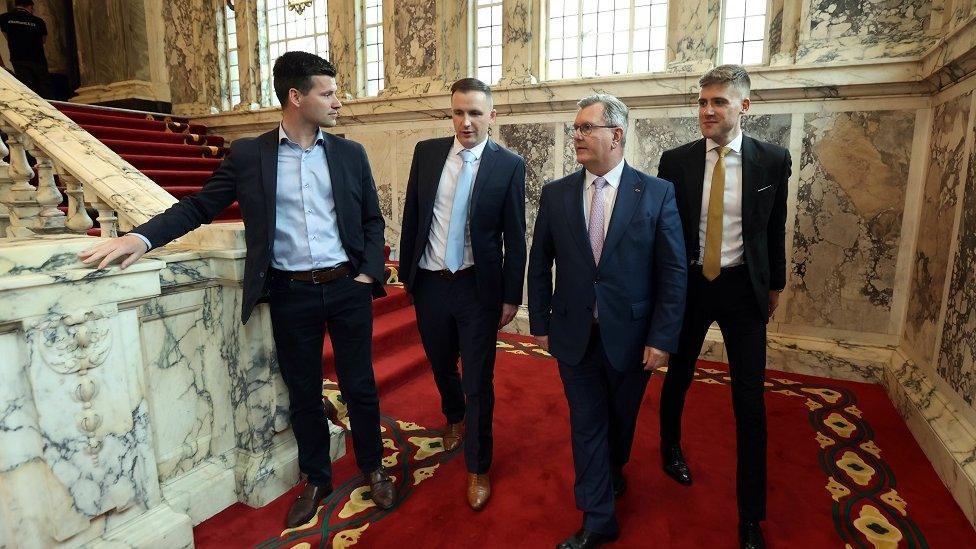
Jonathan Buckley MLA, Councillor Andrew McCormick, DUP leader Sir Jeffrey Donaldson and Councillor Dean McCullough at Belfast City Hall
Running fewer candidates allowed the party to better manage its support base.
That leaves Sir Jeffrey Donaldson with a renewed mandate to seek the changes he needs to the Windsor Framework before returning to Stormont.
But there is nothing to suggest that process could lead to a quick return of the power-sharing institutions.
Much will depend on whatever legislation the government brings forward to ease unionist concerns.
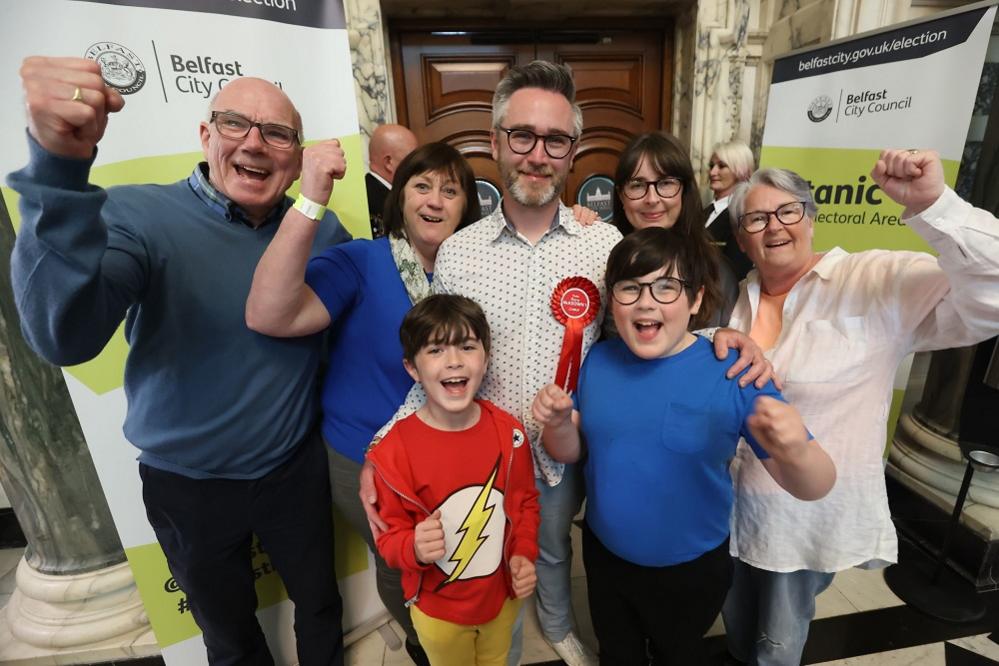
The SDLP's Gary McKeown had support in the form of his sons Thomas and James
Alliance Party leapfrog
On another day the Alliance Party would have grabbed the headlines.
Leapfrogging the Ulster Unionists to become the third-largest local-government party is another momentum builder.
Picking up an extra 14 seats has made the party a formidable force on mostly unionist controlled councils.
But the loss of its only two councillors in Derry and Strabane is a significant blow for a party keen to build beyond its power base in the east.
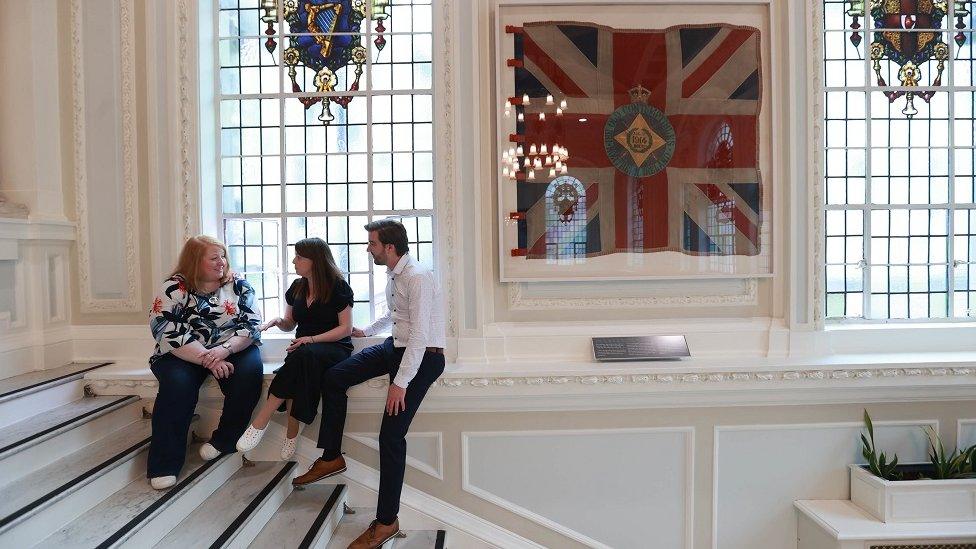
Alliance Party leader Naomi Long with Nuala McAllister and Sam Nelson wait it out at Belfast City Hall on Friday
As expected, the Ulster Unionists and SDLP suffered some heavy losses.
Losing 21 seats has severely weakened the UUP's power base in many councils where the party once dominated.
The party message didn't cut through and with so many Ulster Unionist voters going elsewhere or staying at home, it is difficult to see how its slide can be reversed.
While the SDLP will point to gains and seats retained in Belfast in the face of the Sinn Féin surge, the party has lost ground in Derry and Strabane where it is eight seats behind Sinn Féin.
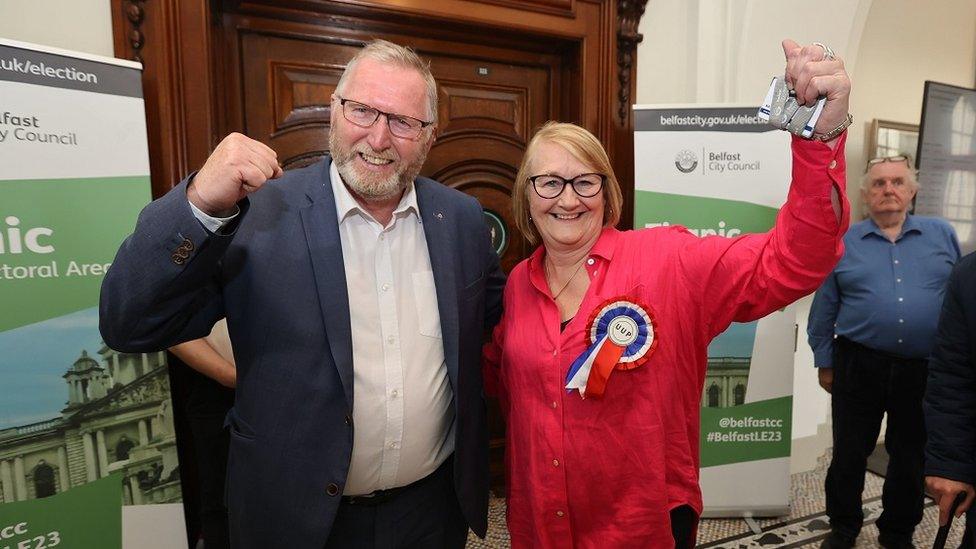
Ulster Unionist Party candidate Sonia Copeland celebrates winning a seat with party leader Doug Beattie
Questions will once again be asked about Doug Beattie's and Colum Eastwood's leadership but even before the final tallies both dismissed any talk of change.
The TUV increased its vote by three and now holds nine council seats which is still below its previous high watermark of 13, although it did take a key seat in Belfast.
While the Green Party held on to three seats but could soon be on the hunt for a new leader after Mal O'Hara lost his seat in Belfast council.
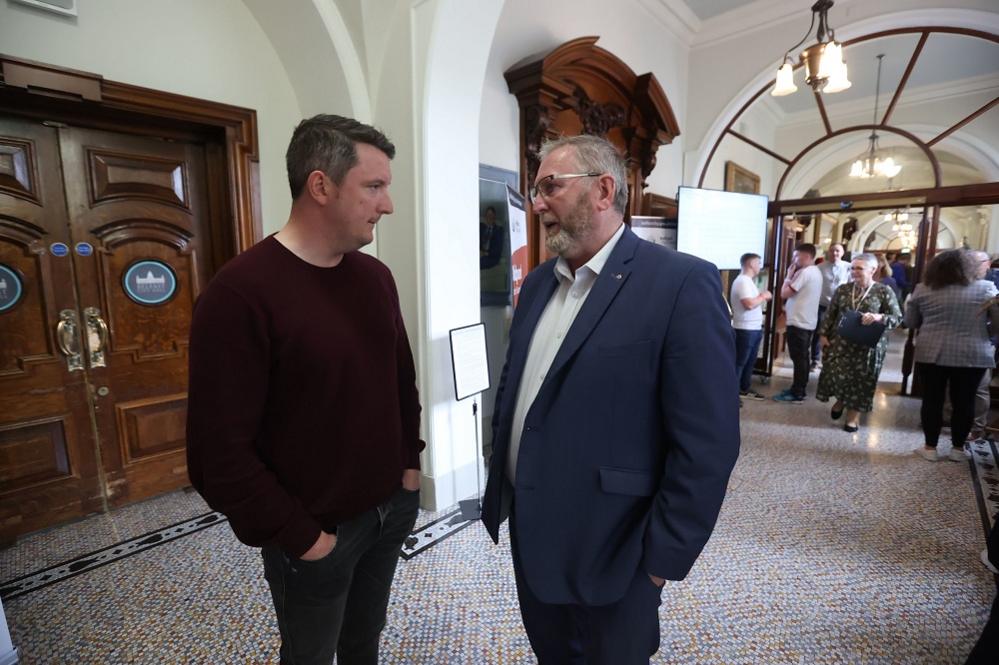
Sinn Féin's John Finucane and UUP leader Doug Beattie stop for a chat
Like the Greens, People Before Profit also felt the squeeze of the Sinn Féin surge and has been reduced to two council seats.
It took the last seat in Belfast and retained another one in Derry and Strabane.
Meanwhile the anti-abortion republican Party Aontú has been wiped from the political landscape after losing its only two councillors.
And we shouldn't forget history was made in Derry yesterday when the first black politician was elected, Lilian Seenoi Barr retained her seat for the SDLP after previously being co-opted on to Derry and Strabane council.
Related topics
- Published19 May 2023
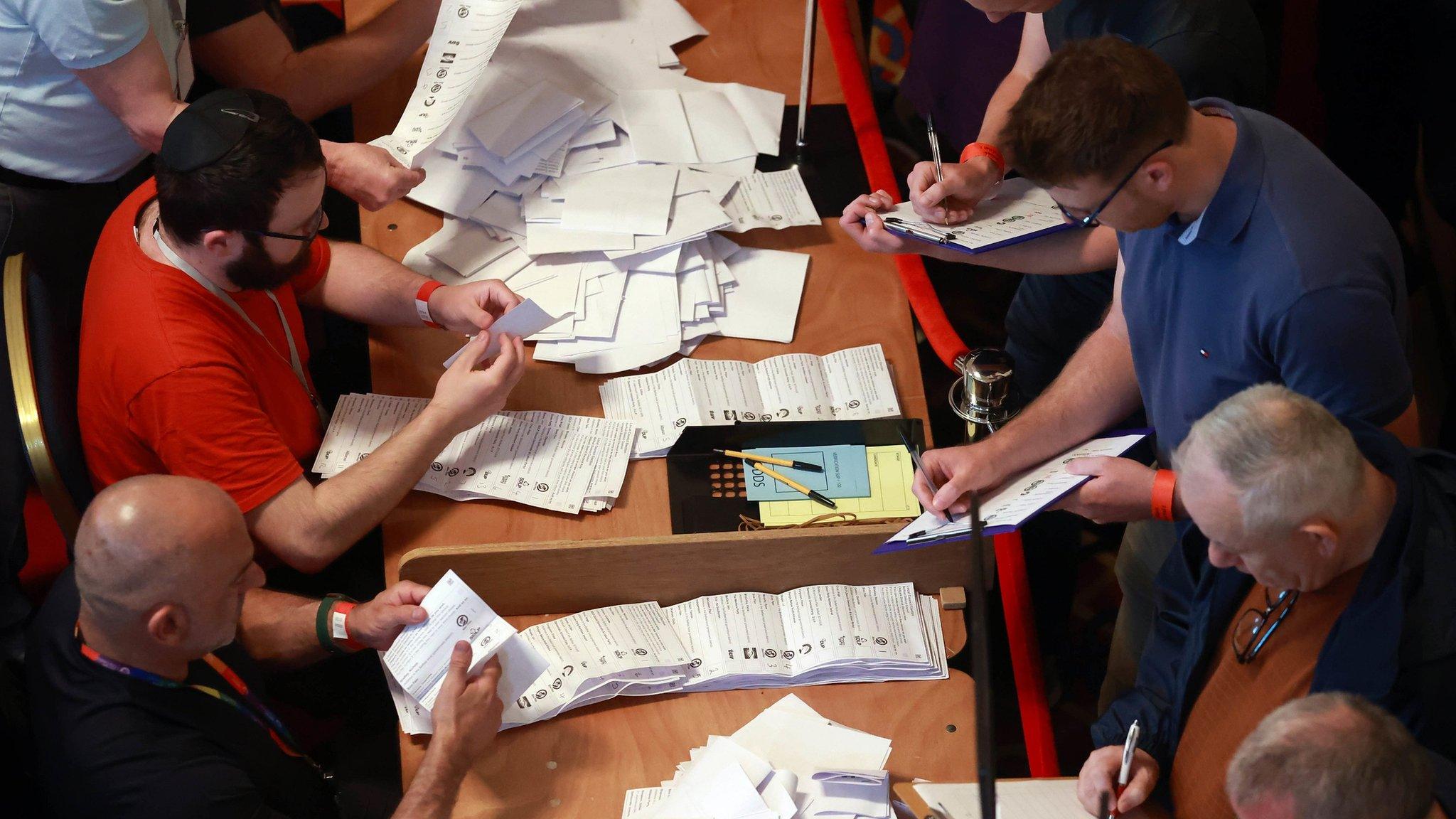
- Published21 May 2023
